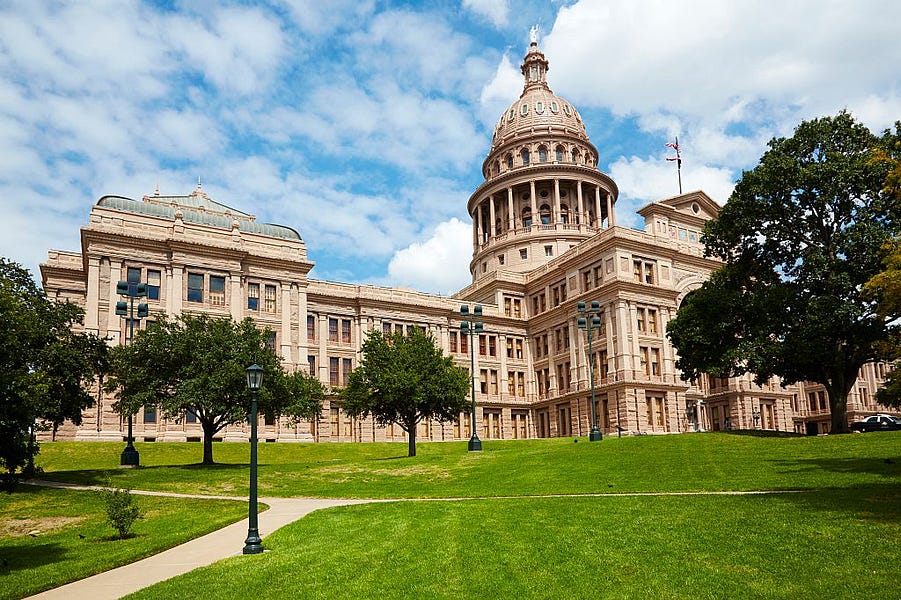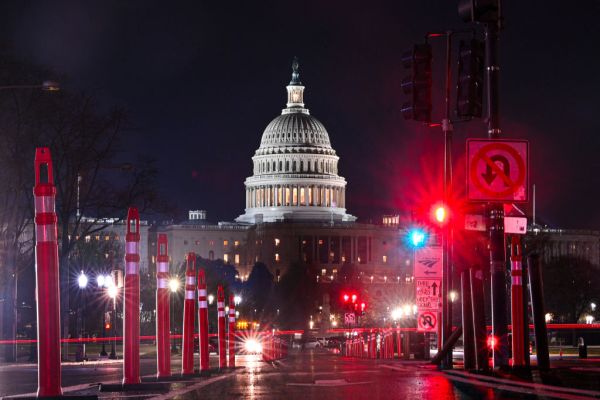Texas Republicans sought to join ranks with legislators in Florida and Georgia last weekend, nearly passing an omnibus elections bill. Senate Bill 7 (SB7), the Election Integrity Project Act, passed the Senate on Sunday and was set for a final House vote that night—the day before Sine Die, the end of the Texas legislative session—when a large group of House Democrats walked out of the chamber, breaking quorum and blocking the vote. The walk-out tactic has been used three times in the state’s history, the last time in 2003. Then, a group of Democrats fled the capitol and stayed in Oklahoma, out of reach of the state troopers the speaker of the House sent to bring legislators back to Austin.
Because the Democrats walked out this time, taking refuge in an East Austin church, the bill will have to wait for a special session for passage. Legislators are already scheduled to meet later this fall to vote on redistricting maps, but Gov. Greg Abbott is expected to call a special session sometime this summer to vote on SB7 and other Republican priority bills.
As with Florida and Georgia, critics are alleging the bill is a return to Jim Crow-era voting restrictions. And, much like Florida and Georgia, the bill’s contents are more complicated than headlines suggest. SB7 requires that mail-in ballots include a driver’s license number or the last four digits of the voter’s Social Security number. It adds a fine for noncompliance with voter registration requirements, after a 30-day grace period to correct violations. Voters who make mistakes on registration forms have 30 days to fix them before the secretary of state steps in to do so, and they face potential fines ($100 per change the secretary of state makes). It prohibits officials from sending early voting and mail-in ballots to citizens who did not actually request one. And it establishes that those who request an early voting ballot by mail due to a disability must affirm that they are, in fact, “physically unable to enter a polling place without needing personal assistance or injuring [their] health.”
Other restrictions seem more reactionary, addressing issues that have not been credibly proven prone to fraud. For instance, during the 2020 election, NRG Stadium (where the Houston Texans play) and the Toyota Center (home of the Houston Rockets) were used as voting locations, including parking garages and lots for drive-through voting, to tremendous uproar from the Texas GOP. SB7 explicitly bans the use of facilities “primarily designed for motor vehicles” to be used as a voting location, and bans drive-through voting unless the voter can not physically enter the voting place.
One area of confusion centers around changes to Sunday early voting hours. SB7 text sets hours statewide to 1 p.m. to 9 p.m., which critics posit is a direct attack on “souls to the polls” initiatives often used in black churches to encourage members to vote on Sundays. Republicans have walked this back, with some claiming it was actually a typo conflating 11 a.m. with 1 p.m., while others (including the bill’s Senate sponsor) doubled down in defense of the change, saying poll workers want to go to church.
Reaction to the bill has fallen along party lines. President Biden released a statement describing the bill “an assault on democracy” and calling on Congress to pass the For the People Act.
Other critics equated SB7 to “Frankenstein’s monster,” alleging racism, ableism, and voter suppression. They cited additional voter identification requirements for mail-in ballots, changes to regulations for voting hours, and roll backs of 2020 election initiatives set in place during the pandemic, primarily drive-through voting. Those critics also argue the election integrity bill is a reaction to Donald Trump’s false claims of a stolen election. Texas Republican St. Rep. Travis Clardy pushed back on that, telling NPR on Monday: “I can tell you in all sincerity, the action we took in the Texas legislature had nothing to do with the Trump election. I serve in the state government in the Texas state legislature. I look at the elections we had this past fall. And I’m very confident and comfortable with the work done by election officials at the statewide level and then throughout the state. I have zero doubt about the legitimacy of elections in Texas. That’s really not the point for us. This is a preventative measure for us.”
While the Department of Justice and various state officials made clear in the wake of the 2020 election that voter fraud was not widespread, a lack of faith in election results among the general public is a troubling issue in Texas. During the 2020 election, a University of Texas and Texas Tribune poll found that “less than half of Texas registered voters [were] confident that Americans will trust the results of the presidential election, and fewer still said they themselves will trust those results.” An additional UT/TT poll from February 2021 found that the majority of Texans trusted state election results, but 30 percent believed the national election results were “very inaccurate.”
Abbott issued a statement on Monday promising that the bill would be dealt with during a special session, but he has not formally called one yet. He has threatened to veto Article X of the state budget, which funds the legislature. “No pay for those who abandon their responsibilities,” Governor Abbot tweeted on Monday. His statement was met with criticism from both sides of the aisle, and the threat has yet to be enacted.
The Texas Legislature meets for 140 days every two years, with the option for the governor to call for a special session any time during the interim. With 150 House members, there must be 100 present in the chambers to reach a quorum. Currently, Democrats hold 67 seats. Democrats have threatened to walk out of the chambers again if it comes up during the special session. On Sunday, the Democrats benefited from timing: All they had to do was run out the clock on the legislative session. But failing to reach a quorum during a special session would mean Democrats couldn’t vote on their own priorities. Realistically, unless they want to continue to be called back to Austin for special session after special session, Texas Democrats will have to vote on the bill eventually.
Emma Rogers is an editorial intern with The Dispatch, and graduate student at the University of Texas. She lives in Austin with her husband and toddler. Twitter @emw_96.







Please note that we at The Dispatch hold ourselves, our work, and our commenters to a higher standard than other places on the internet. We welcome comments that foster genuine debate or discussion—including comments critical of us or our work—but responses that include ad hominem attacks on fellow Dispatch members or are intended to stoke fear and anger may be moderated.
You are currently using a limited time guest pass and do not have access to commenting. Consider subscribing to join the conversation.
With your membership, you only have the ability to comment on The Morning Dispatch articles. Consider upgrading to join the conversation everywhere.